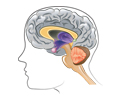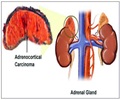Low levels of the stress hormone cortisol could be linked to antisocial behaviour in adolescent boys, UK researchers say. Indeed bad behaviour could be a form of mental illness, they believe.
An increase in cortisol levels is thought to make people behave more cautiously, and help them to regulate their emotions, particularly their temper and violent impulses.But a Cambridge university study found this did not happen in boys with a history of severe antisocial behaviour.
For the Biological Pyschiatry study, the Cambridge team recruited participants for the study from schools, pupil referral units and the Youth Offending Service.
Samples of saliva were collected over several days from the subjects in a non-stressful environment to measure levels of the hormone under resting conditions.
The young men then took part in a stressful experiment that was designed to induce frustration.
Samples of saliva were taken immediately before, during and after the experiment to track how cortisol changed during stress.
Advertisement
The researchers said the results suggest that antisocial behaviour may be more biologically-based than previously considered, just as some individuals are more vulnerable to depression or anxiety due to their biological make-up.
Advertisement
"We may also be able to create targeted interventions for those at higher risk.
"A possible treatment for this disorder offers the chance to improve the lives of both the adolescents who are afflicted and the communities in which they live."
Professor Sheilagh Hodgins, of the Institute of Psychiatry at King's College London, said there was a wealth of studies linking physiological markers to problem behaviour.
For instance, a low pulse rate in children had been linked to a raised risk of later criminal behaviour.
But there was no proof that hormone levels - or any other physiological marker - actually caused the bad behaviour.
However, she said the study might help experts to maximise the effectiveness of therapy, such as parenting classes.
Such therapy has a good track record in improving behaviour, but Professor Hodgins said therapists might have to work harder with young people with low cortisol levels, who may find it harder to become engaged.
"The low cortisol suggests they are just too cool, too laid back, so you want to make even more of an effort to get them involved in positive situations that can help them change," she said.
Marjorie Wallace, of the mental health charity SANE, said the study may help antisocial behaviour to be viewed as a health issue, rather than a purely criminal one.
She said: "More work needs to be done, but we welcome the possibility of developing better treatments and approaches that can help troubled young men to lead less destructive and more productive lives."
Source-Medindia
GPL/SK













